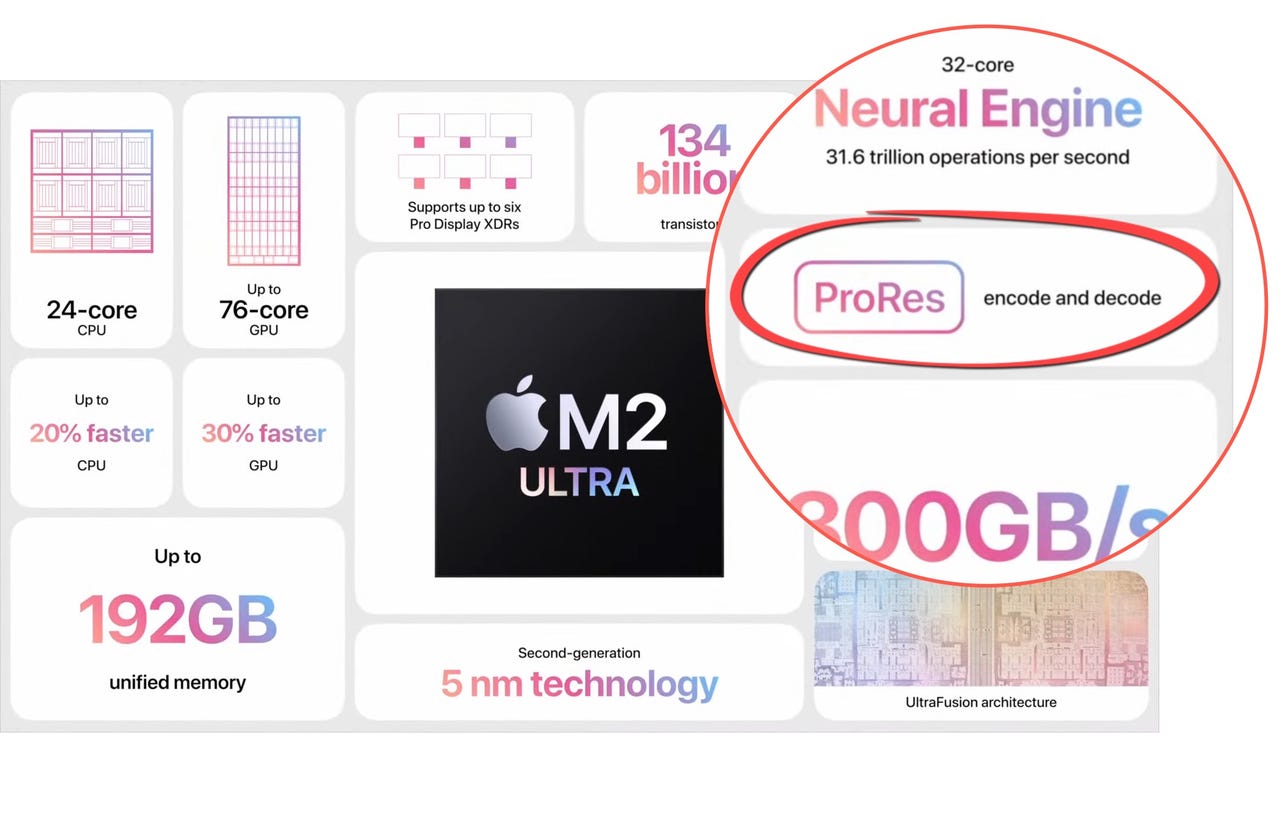
































The M2 Ultra spec sheet.
AppleIf you watched Apple's WWDC 2023 keynote the other day, you probably noticed Apple mentioned "ProRes" a few times.
For example, the new M2 Ultra chip features "ProRes encode and decode," while the new Mac Pro can handle "up to 22 streams of 8K ProRes."
Also: Every hardware product announced at WWDC
But what is ProRes, and why does Apple talk about it like it's a stress test for a system?
Keeping it simple, ProRes is a video codec (short for encoder/decoder, or sometimes compressor/decompressor) developed by Apple that is used for video files. Dating back to 2007, ProRes is special because while it compresses the video -- and this compression results in some of the image detail being lost (this is often referred to as "lossy") -- the lost image detail is not visually noticeable.
In other words, ProRes is a visually lossless, lossy video compression format.
Videographers and cinematographers love ProRes because it offers amazing detail and color depth, and you can take the files and process them and color grade them to give that perfect look without losing quality, while the compression keeps the file sizes more manageable.
Also: How to preorder Apple's new MacBook Air, Mac Studio, and Mac Pro
Well, sort of manageable, because ProRes files can still be thirty times the size of a similar file saved using a codec such as HEVC (which is short for High Efficiency Video Coding).
To confuse matters even further, there are different types of ProRes, ranging all the way from ProRes RAW, which is the highest quality format but limited to certain cameras, to ProRes 422 HQ, which is a high-quality format that you see on professional cameras and drones, to ProRes 422 Proxy, which is a highly compressed version used to speed up editing (you edit and color grade the lightweight, compressed ProRes 422 Proxy files, then swap them for higher quality ProRes versions before outputting, which gives you greater workflow speed while editing, without sacrificing quality).
If you want to nerd out on ProRes, Apple has an in-depth whitepaper you can digest, and this goes into quite a lot of detail about ProRes and the different flavors offered.
OK, but what does any of this have to do with the M2 Ultra?
Also: All the Mac news from WWDC 2023: Mac Pro, Mac Studio, and M2 Ultra
Because ProRes is an Apple codec, Apple has been building support for it in its chips. Both the M1 and M2 chip lines feature hardware video codec encoding and decoding support for ProRes (as well as other popular video formats, including HEVC, H.264, and H.265) to optimize working with these formats.
And it's not just the M1 and M2 chips. The A-series chips found in iPhones and iPads also have support for ProRes.
I've been using ProRes in a limited way for a few years now, and I always considered it a heavyweight codec to use. You needed a lot of processing power and RAM, and editing and playing back high-resolution ProRes clips were demanding on even the highest-end system.
That is, until Apple Silicon came onto the scene.
Also: Apple announced a ton of new software features at WWDC. Here's everything new
M1 and M2 chips make working with ProRes easier than it ever was using Intel processors. I can work with huge 5K ProRes video files from drones (such as theDJI Mavic 3 Pro Cine ) and video cameras on myMacBook Pro , and it doesn't break enough of a sweat to turn on the fans.
Now, I only work with a few ProRes files, but if I was a professional cinematographer, the Mac Pro would let me do more.
Much more.
Delving into the specs of thenew 2023 Mac Pro , I find that it can handle playing back a "1-minute picture-in-picture project with 22 streams of Apple ProRes 422 video at 8192 x 4320 resolution and 30 frames per second" in Final Cut Pro.
I remember when handling one stream of ProRes was demanding. This is a mind-blowing amount of data that the system is having to process, and the sort of workload that few will ever need.
Also: How to update every Apple device (iPhone, iPad, Apple Watch, Mac, and more)
But it's now there for those who need it.
And this is why Apple talks about ProRes. For a lot of people, it doesn't mean much, but for those who know, it means a lot.
 Etiquetas calientes:
Nuestro proceso
negocio
empresas
manzana
Etiquetas calientes:
Nuestro proceso
negocio
empresas
manzana